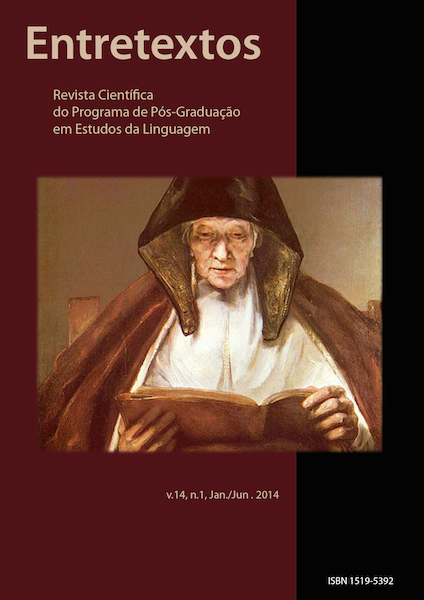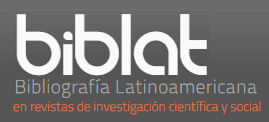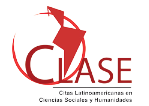Contributions of the functional theory in the analysis of the genre report
DOI:
https://doi.org/10.5433/1519-5392.2014v14n1p218Keywords:
Genres, Report, Functionalism, PrototypicalityAbstract
This article aims to highlight the role of linguistic structures in the creation of reports more prototypical. Therefore, we analyzed the linguistic processes of this genre in text productions required in the university’s entrance examination. This investigation follows the line of Decat (2008) and brings a set of ideas that subvert the order established by theorists and scholars of the textual and/or speech genres, since these ideas endorse the study of the degrees of commitment to the linguistic structures of texts. Thus, form-function, assuming that the principle of the form is an effect of the function, were analyzed in the texts, due the fact that the socialcommunicative function of the genre is consider essential for the linguistic choices made by language users.
Downloads
References
BAKHTIN, Mikhail. Estética da criação verbal. São Paulo: Martins Fontes, 2000.
BAKHTIN, Mikhail. Estética da criação verbal. 4. ed. São Paulo: Martins Fontes, 2003.
BRASIL. Secretaria de Educação Fundamental. Parâmetros Curriculares Nacionais: Língua Portuguesa. Brasília: MEC/SEF, 1997.
BRONCKART, Jean-Paul. Atividades de linguagem, textos e discursos. São Paulo: EDUC, 1999.
COSTA, Sônia B. Borba. Funcionalismo e ensino de língua materna. In: CHRISTIANO, Maria Elizabeth, SILVA, Camilo Rosa; HORA, Demerval da (org.). Funcionalismo e gramaticalização: teoria, análise, ensino. João Pessoa: Ideia, 2004. p. 227-264.
DECAT, Maria Beatriz Nascimento. A relevância da investigação dos processos linguísticos, numa abordagem funcionalista, para os estudos sobre os gêneros textuais. In: ANTONIO, Juliano Desiderato (org.). Estudos descritivos do português: história, uso, variação. São Carlos: Editora Claraluz, 2008. p 169-191.
DIK, C. S. Functional Grammar. Dordrecht –Holland / Cinnaminson- EUA: Foris Publications, 1978.
DOLZ, Joaquim; SCHNEUWLY, Bernard. Gêneros e progressão em expressão oral e escrita - Elementos para reflexões sobre uma experiência suíça (francófona). In: ROJO, Roxane; CORDEIRO, Glaís Sales (Org.). Gêneros orais e escritos na escola: tradução de trabalhos de Schneuwly e Dolz, Campinas: Mercado de Letras, 2004. p. 38-71.
MAINGUENEAU, Dominique. Análise de textos de comunicação. Tradução de Cecília P. Souza-e-Silva e Décio Rocha. São Paulo: Cortez: 2002.
MARCUSCHI, Luiz Antônio. Gêneros textuais: definição e funcionalidade. In: DIONIOSIO, Angela paiva; MACHADO, Anna Rachel, BEZERRA, Maria Auxiliadora (Orgs.). Gêneros textuais e ensino. 3. ed. Rio de Janeiro: Lucerna, 2005. p. 19-36.
PASQUIER, Auguste; DOLZ, Joaquim. Un decágono para enseñar a escribir. Cultura y Educación, Madrid, v. 2, p. 31-41, 1996.
SANTOS, G. T. S.; BARBOSA, J. P. Gêneros do discurso. In: SANTOS, G. T. S.; BARBOSA, J. P. Língua Portuguesa no Ensino Fundamental: por uma abordagem enunciativa. São Paulo: PUC, 1999. Parte 2, p. 01 – 10.
SOUTO, Ângela Maria da Silva; LEAL, Leiva de Figueiredo Viana. Textualização do discurso de relato. Currículo Básico Comum: Língua Portuguesa Ensino Médio. Centro de Referência Virtual do Professor – SEE-MG: 2009.
Downloads
Published
How to Cite
Issue
Section
License
Entretextos adota a Licença Creative Commons Attribution 4.0 International, portanto, os direitos autorais relativos aos artigos publicados são do(s) autor (es).
Sob essa licença é possível: Compartilhar - copiar e redistribuir o material em qualquer suporte ou formato. Adaptar - remixar, transformar, e criar a partir do material, atribuindo o devido crédito e prover um link para a licença e indicar se mudanças foram feitas.




















